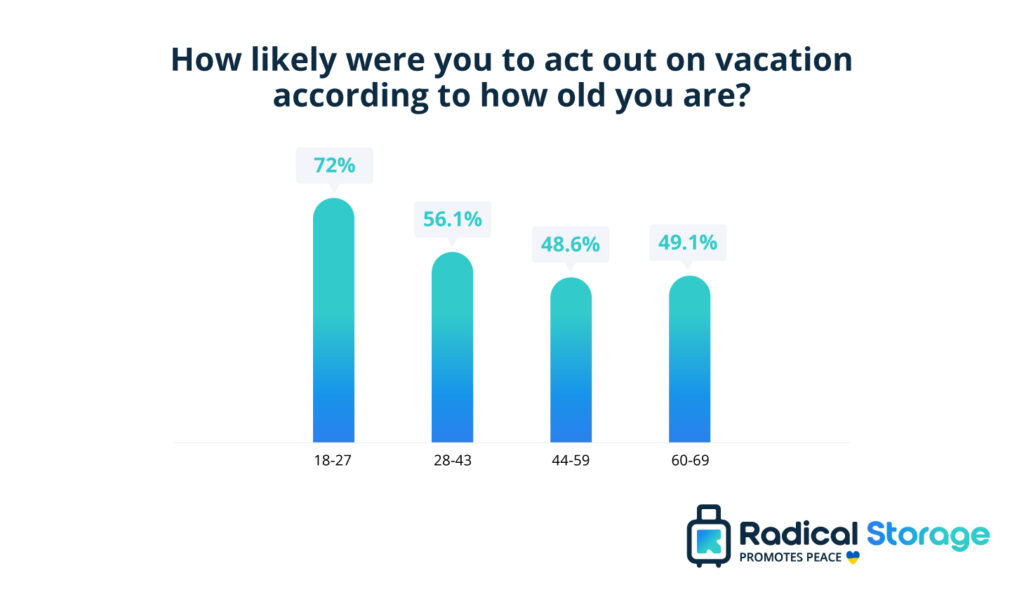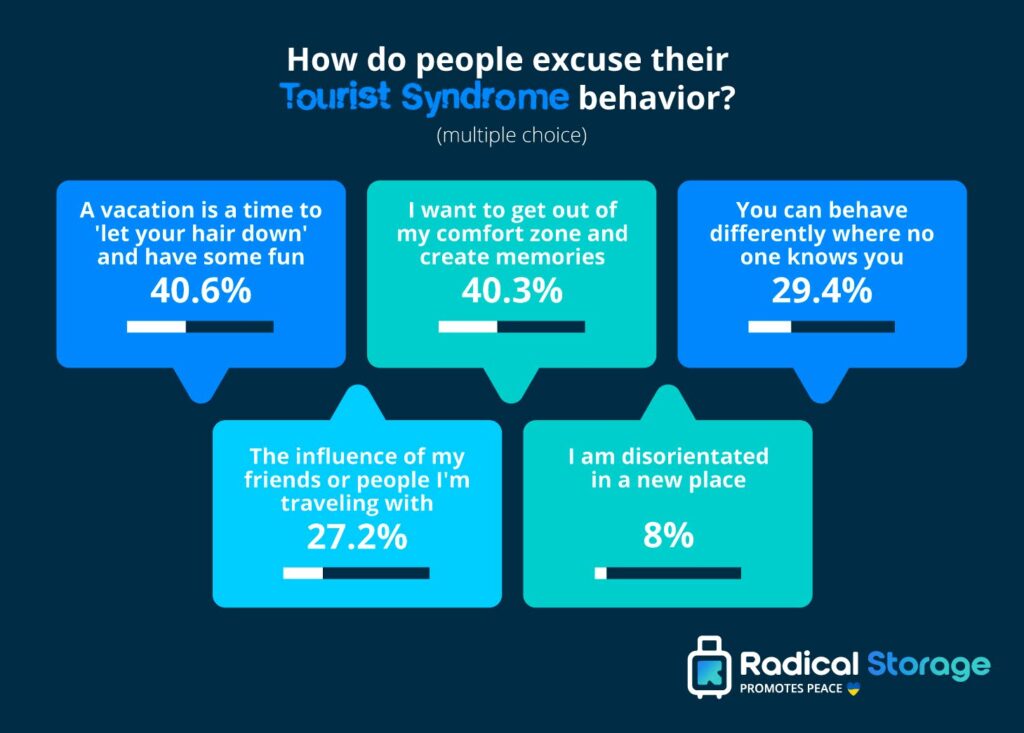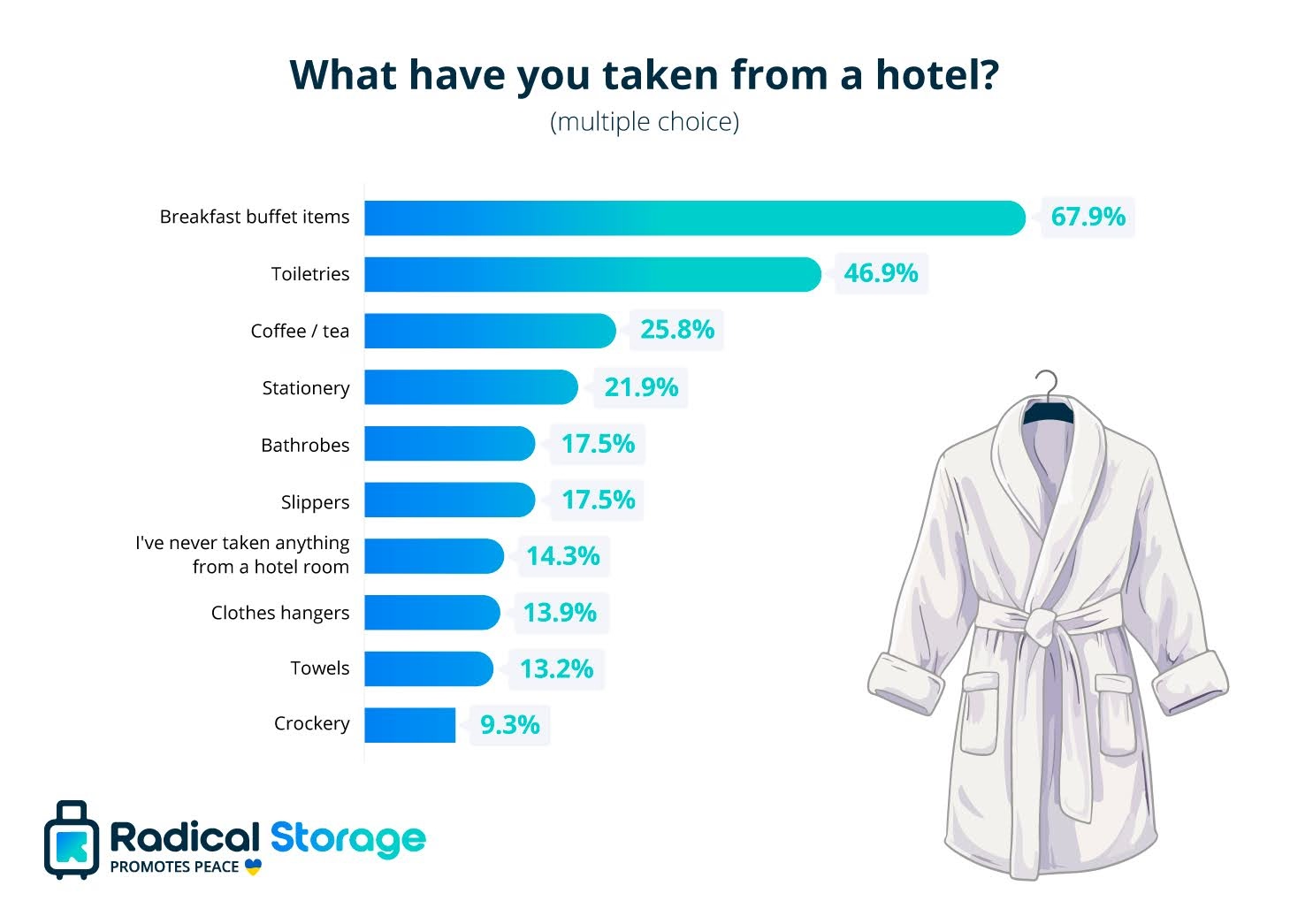
Tourist Syndrome: Why Travel Brings Out the Worst in Us
From tossing coins into plane engines for luck to posing inappropriately with statues, and even engaging in risky escapades at historic sites, tourist misconduct is making headlines like never before. In the past year alone, reports of “bad behavior on vacation” have surged by over 500%, reflecting a concerning trend we’ve dubbed “tourist syndrome”—the tendency to act out of character, and often irresponsibly, while traveling.
Some places, like Copenhagen, are actively rewarding tourists for good behavior, whereas other places, like Spain, are seeing waves of anti-tourist protests.
We would like to think that the average person wouldn’t dare slap an airline agent or take nude photos at a sacred temple, but to what extent is the average person inclined to ‘let loose’ on vacation, and with what consequences?
Radical Storage surveyed 1,231 Americans about their behavior on vacation, how they justified their behavior, and general questions on the issue to find out.
Key findings
- Most people (56.5%) experience tourist syndrome on vacation
- Lawbreakers: over four in ten (42.5%) admit to breaking the law on vacation
- Half of people (49.7%) would play the tourist card to get out of trouble on vacation
- A third of people (32.3%) have posed inappropriately with a statue
- Cheaters: four in ten (41.3%) have cheated on their partner on vacation
Most people (56.5%) experience tourist syndrome on vacation
How does the average person behave on vacation? When we asked our respondents whether they were more likely to do something out of character on vacation, most people (56.5%) said they were, with half of the people (51.7%) also saying they were more likely to act out abroad (51.7%).
And you are more likely to act out on vacation the younger you are. Seven in ten (72%) of those aged between 18-27 (Gen-Z) said they are likely to behave differently on vacation; over half (56.1%) of people aged between 28-43 (Millennials) said that they would, plateauing at 48.6% of 44-59-year-olds (Gen-X) and 49.1% of 60-69-year-olds (Boomers).

But bad behavior does come with remorse and self-awareness. Three in five (62.1%) have been embarrassed by the behavior of someone they were traveling with, and half (50%) have been embarrassed by their own behavior.
Tourist behavior: Four in ten (42.5%) admit to breaking a law on vacation
Half of people (54.9%) admit to being told off while on vacation, but there’s a big difference between being a little too rowdy at a restaurant and committing a crime.
Laws can be very different in different countries. For example, in many European countries (like Italy) there is no minimum age to consume alcohol in public or private, but in other countries, like Saudi Arabia, the Maldives, or even parts of Canada, drinking alcohol is prohibited. When vacationing, you could think you are breaking a law when you’re not, or break the law without even realizing it.
Considering this, four in ten (42.5%) people admitted to having broken a law on vacation, and (6.3%) say they might have. When asked whether they have broken a law whilst on vacation that they wouldn’t be at home, 43.8% said yes.
Some demographics were more likely to admit to breaking the law on vacation than others. Men were more likely to have broken the law whilst on vacation than women (50.2% of men compared to 37% of women), and seven in ten (70.9%) of those spending $3,000-$5,000 per week said they had broken a law abroad.
 Tourists behavior: One-third of people (32.3%) have posed inappropriately with a statue
Tourists behavior: One-third of people (32.3%) have posed inappropriately with a statue
We’ve established that most people behave differently on vacation, but what travel sins and bad habits are Americans most likely to commit?
Half of people are more likely to drink on holiday (53.1%), but these aren’t the only vices people indulge in on vacation. Three in ten (29.7%) are more likely to smoke, and 13.1% are more likely to take illicit drugs. Gambling is also a common vacation past-time, as half had visited a casino on vacation (48.9%) and 27.8% would be more likely to go to a casino on vacation.
But what more travel-specific faux pas do people admit to?
The top three most common travel-related ‘no-nos’ people admit to doing are becoming more territorial on holiday (34.7%) (e.g., putting towels down to mark your place by the pool), posing inappropriately with a statue (32.3%), and picking plants in a nature reserve, public garden, or plants on someone’s private property without permission (30.2%).
Although these behaviors might seem harmless to some, they can have far-reaching consequences. Recently, a tourist sparked outrage in Florence after she climbed up a bronze Bacchus statue and posed sexually inappropriately with it. Locals are now demanding Florence introduce tight controls and high fines for misbehaving tourists.
And although mindlessly picking plants or interacting with stray animals may feel like a means to ‘connect with nature’, activists are bringing attention to the ecological damage of outdoor tourism – which some claim is even speeding up the effects of climate change.
Tourist behavior: Four in ten have cheated on their partner on vacation (41.3%)
Films and TV glamorize the idea of a holiday romance, and the survey found that one-third of people feel more flirty on holiday (34.9%).
But it’s not just single people feeling amorous abroad. Four in ten (41.3%) of people admit to having cheated on a partner whilst on vacation. Men are more likely to have cheated on a partner on vacation (46.5% of men compared to 37.9% of women).
One in ten (12.9%) said they would be more inclined to hire a sex worker on vacation
Being a bit more flirty on vacation might be excusable, but there are more troubling ways to misbehave abroad. Examples of sex tourism (the practice of traveling, to engage in sexual activity) can range from a trip to the red-light district in Amsterdam to darker practices like buying weeklong ‘marriages’ in countries such as Indonesia.
Many sex tourism destinations have a conflicted relationship with the practice. in a bid to push party tourists out, Amsterdam recently announced they are relocating their famous red-light district outside the city center.
Three in ten (28.8%) said they had gone to a strip club on vacation. One-third of people (35.7%) also said they were more likely to go to a strip club on vacation, and 12.9% said they would be more likely to hire a sex worker. One in ten (12.4%) were also more likely to catcall someone.
Tourist behavior: Almost nine in ten (85.7%) have taken something from a hotel
Rock stars are infamous for trashing their hotel rooms, but is it common to be less respectful when we stay away from home? Half of respondents (53.1%) said they leave their hotel room messier than at home, but what else?
When it comes to bad behavior in hotels, almost nine in ten (85.7%) have taken something from a hotel. Most people
(67.9%) admit to sneaking out breakfast items at the hotel buffet to eat later, but that’s not the only item people are taking away with them. Nearly half of people have taken toiletries away with them (46.9%), a quarter of people have taken away coffee or tea (25.8%) and one in five have taken away hotel stationary (21.9%).
Taking these low-value items might not stir debate, but stealing other property might divide opinion. One in ten people has stolen clothes hangers (13.9%), towels (13.2%) or crockery (9.3%) from a hotel.
And, although Americans have an international reputation for tipping well, most Americans tip the same or less than they would usually (59.6%). It’s luxury holidayers who are the tightest on holiday; people who budget more than $5,000+ per week were almost twice as likely to tip less than usual (31.8% compared to 17.4%).

Four in ten (40.6%) excuse their tourist syndrome by arguing that ‘a vacation is a time to let your hair down and have some fun’
With so many people admitting to behaving badly on vacation, what were the top excuses people gave for acting out of character?
The top reason people gave for acting out was that a vacation is a time to ‘let your hair down and have some fun (40.6%)’. The next most common reasons were ‘to get out of my comfort zone and create some memories’ (40.3%) and because ‘you can behave differently where no one knows you’ (29.4%)
With so many selfie-related incidents, it’s perhaps unsurprising that half of people think that social media makes people behave worse on vacation (49.1%).
And despite admitting to bad behaviors themselves, most people (61.4%) think there should be harsher punishments for people who misbehave on vacation.
And – another indicator of self-awareness –most Americans (63%) think Americans behave badly abroad, although 8.1% say that other nations behave even worse.
Half of the people (49.7%) would play the tourist card (e.g. claim they misunderstood the rules) to get out of trouble on vacation
Although 60% of people said they research the rules and etiquette of the country they are visiting, and 20% sometimes do, half of people would play dumb and pull the tourist card to get out of trouble on vacation (49.7%).
Again, the younger you were, the more inclined you would be to pull the ‘tourist card’ and claim you misunderstood the rules. Gen-Z were most likely to use this excuse (65.9%), dropping with each age group to just 17% of Boomers.





 Tourists behavior: One-third of people (32.3%) have posed inappropriately with a statue
Tourists behavior: One-third of people (32.3%) have posed inappropriately with a statue




